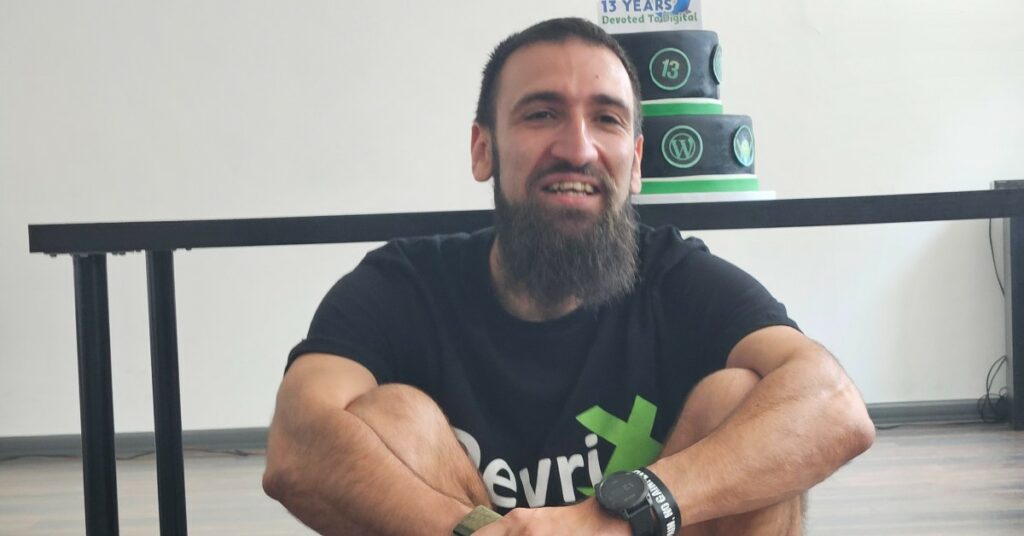One of the biggest dilemmas for entrepreneurs is choosing whether to build everything themselves or buy the technology that will help them on their journey.
While building something from scratch is common sense, Bulgarian entrepreneur Mario Peshev believes the “buy versus build” consideration is not uncommon.
A serial entrepreneur and e-commerce developer, Peshev prefers building key tech himself, while purchasing supporting technology and services on Flippa, the #1 marketplace for buying and selling online businesses.
He describes himself as an early adopter, having signed up for Flippa more than 11 years ago and completed more than 40 transactions on the platform.
So what attracted Peshev to Flippa? He says the whole platform is incredibly helpful for entrepreneurs like himself.
Peshev isn't alone: over X number of transactions happen every day on Flippa, a platform where companies are bought and sold before turning into completely different businesses.
![]()
![]()
E-commerce Actions


Perhaps no other entrepreneur evangelizes Flippa's cause as much as Peshev, but to understand his journey with Flippa, it's important to understand his entrepreneurial beginnings.
Peshev is among the entrepreneurs keeping the e-commerce wheels turning even as consumers hit the “buy now” button more frequently than usual, as e-commerce businesses boomed in the five days between Thanksgiving and Cyber Monday and Americans spent a record $9.8 billion on Black Friday, according to Adobe Analytics.
Despite his background in e-commerce, Peshev is no ordinary web entrepreneur, and his use of a platform like Flippa to support his entrepreneurial journey speaks to his own vision.
His first experience with digital solutions was building his first static website in 1999. After launching the website, he ran a few forums and online classifieds for a few weeks before moving fully into software engineering.
“Over the past two decades, I have worked with dozens of prominent e-commerce brands as an advisor, lead engineer, founder, partner, agency owner and investor,” he said, adding:
In 2010, he founded DevriX as a European digital technology agency providing growth, strategy, engineering and data services to a portfolio of clients.
What began as a boutique WordPress consulting firm allowed Peshev to “take a leadership position with top partners,” and his entrepreneurial soar has shown no signs of stopping.
DevriX now has a team of 50 people who help clients develop roadmaps and go-to-market strategies, with Peshev noting that some of its clients are in their ninth year with the startup.
In addition to running DevriX as CEO, Peshev also leads Shopify's delivery tracking software, Rush.
He sees Rush as a unique opportunity to “conquer the world's largest e-commerce platform.”
When we spoke to Peshev, he and his team were hard at work preparing for the busy shopping season, and he called the experience “exhilarating.”
“As engineers, we build the most robust, scalable systems that can withstand massive traffic peaks,” he explains.
But as a marketer, Peshev also has the opportunity to continually and repeatedly test numerous channels and funnels to identify the highest-converting landing pages and offers in his market.
Every single one counts!


The e-commerce business is tough, and understanding the business processes is even harder, but Peshev says the only way to succeed is to realize that everything matters.
Peshev said DevriX and Rush manage and advise numerous store owners across a range of use cases, including brand development, dropshipping, expanding low-cost, high-volume sales for boutique products, multi-channel expansion, and increasing conversions through FOMO and other typical strategies in the marketplace.
He explains that e-commerce entrepreneurs go through various stages, including selecting production and products, building high-converting product pages, establishing growth channels, creating engaging and cost-effective campaigns, handling customer support and retention, and coordinating logistics, supply management, staffing and outsourcing.
Peshev said through his startup Rush, the company takes care of the post-purchase experience through a flexible delivery tracking mechanism that is tied to email flows and SMS interactions.
“The app integrates bundles and other upsell formats into your tracking pages, increasing your brand's GMV with no additional effort. It's flawless and works extremely well on autopilot,” he says.
DevriX, on the other hand, takes a customized approach by evaluating the current user journey, AOV, funnels, campaigns, conversion rates, and every other aspect of the buying experience.
Peshev adds, “We will look more closely at cost of goods sold and profit margins, supply constraints, return rates, and resources available for advertising campaigns.”
In addition to this expertise, DevriX also assists clients with omnichannel campaigns, email marketing flows, on-site and off-site SEO, social media remarketing, and more.
DevriX’s B2B clients also leverage HubSpot expertise as an agency partner, and Semrush Flow for content generation at scale.
Meet the Flippreneurs


Peshev embraced Flippa while keeping an eye on various opportunities including blogs, small SaaS projects, and apps.
“My first purchase was a WordPress theme as an agency owner,” he said, adding, “This was the turning point for me to set up my own little shop and generate recurring revenue from subscriptions.”
This first purchase sparked dozens of other small and medium sized purchases to follow over the years.
Peshev reiterates his earlier thoughts on build vs. buy, arguing that you should consider whether it's worth launching something from scratch and growing it over a few months, or whether you should just buy an existing solution that has some traction or customers.
Peshev has made more than 40 purchases on Flippa through his own account, and said he has also facilitated five- and six-figure real estate sales on the platform.
“I've preached the Flippa model at entrepreneur and startup events, and I know solopreneurs who are building and selling properties in the process,” he jokes.
While the platform offers many benefits to entrepreneurs like Peshev, he said the valuations of the companies listed on the platform always meet market standards, making it an attractive tool for both buyers and sellers.
He said he has seen benefits from using Flippa's AI recommendation engine as a marketplace and ratings evaluation tool.
He works with angel investors, entrepreneurs and even venture capital funds and finds the tool useful for “adjusting their revenue forecasts and acquiring smaller brands or companies for integration or merger.”
Start saving


How can an entrepreneur build a successful e-commerce business? Peshev says the best approach is to save up some capital and start frugally.
He advises entrepreneurs building e-commerce businesses or launching ventures using Shopify to make the most of organic channels.
As social platforms morph into shopping platforms, he also recommends mastering Facebook and TikTok ads with a modest daily budget to accelerate growth.
He adds, “Incremental improvements can make a big difference if you know how to interpret the data and craft product copy and creative at scale.”
Peshev's decades-long journey as an e-commerce and Web 2.0 entrepreneur has not been without many trials and tribulations.
“I have a stoic approach that is centered around continuous learning and experimentation,” he says.
Peshev preaches what he follows and believes that a combination of his experience and adaptability has led to his success as an entrepreneur.
He adds that entrepreneurs benefit from data-rich context about available channels and strategies, as well as a continuous A/B testing workflow to research and capitalize on the latest market trends and consumer behaviors.
The adviser to many e-commerce companies said it's always helpful to have a trusted advisor who's been through the entrepreneurial life, but for those who can't find one, he believes “getting muddy in the sand is the best teacher.”
As investors increasingly prioritize profitability over growth, Peshev's advice could mean the difference between success and ruin.
He sees current investor sentiment not as a market problem, but as a need to weed out unsustainable businesses and preserve quality ones.
“We hope more entrepreneurs will adopt a phased approach of slowly but surely expanding their stores, adopting resilient practices and growing healthy brands over time,” Peshev says.
Building a sustainable business
Peshev sums up his entrepreneurial journey as a quest to build a sustainable business that can scale with the help of platforms like Flippa.
As the largest marketplace, Flippa attracts all buyers and offers the greatest opportunities for buyers, he says.
Flippa added that it designs its technology to ensure transactions go smoothly every time and that solutions to questions are found quickly.
“The due diligence process is also clear and streamlined,” he adds.
He buys online businesses on Flippa, and believes sellers can quickly generate more traffic and attract more offers.
Peshev is a great example of an entrepreneur who not only started a business but also had no hesitation in acquiring businesses that could support his own operations.
He says all entrepreneurs should focus on building a sustainable business that “doesn't depend on you.”
“A good asset is a turnkey machine that operates somewhat independently, with little oversight or standard processes,” he adds.
His advice on maintaining stable financial data by obtaining Stripe records and Google Analytics for transparent reviews is always good, but especially useful at a time when investors are being extra cautious before investing.
“If you keep your web properties in order, buyers will come,” he concludes with clear conviction.




